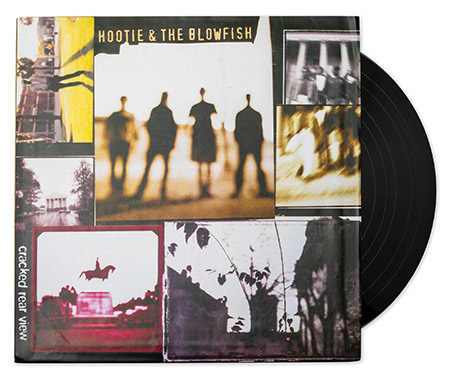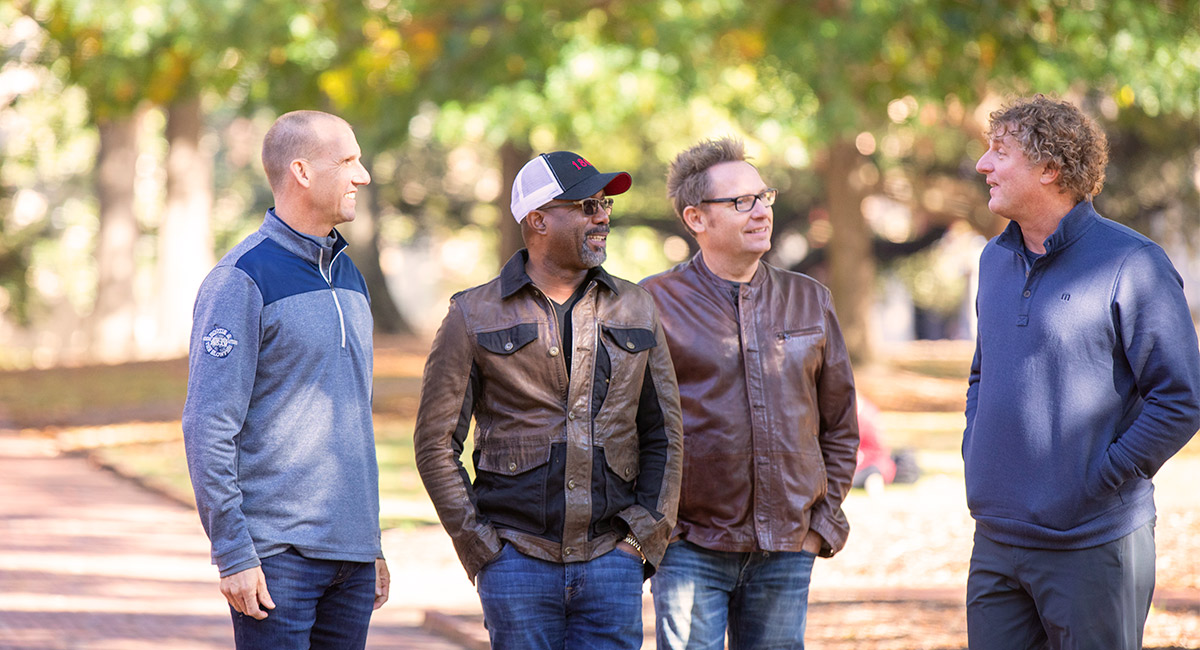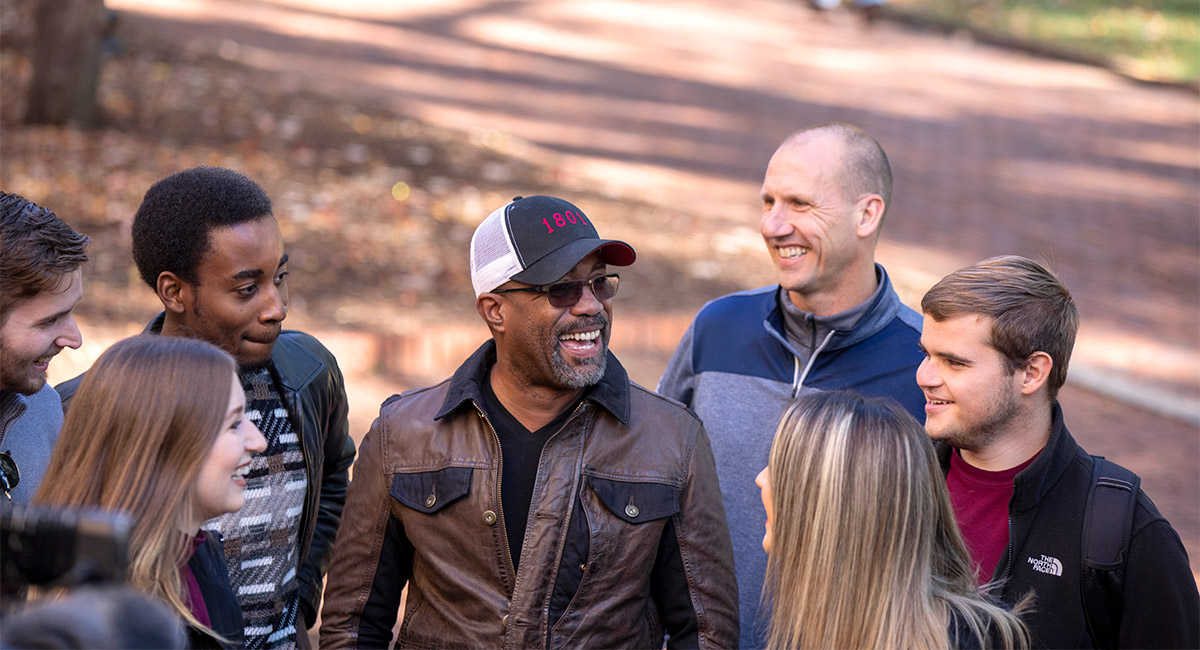Rear View Reflection
UofSC alumni Hootie & the Blowfish look back on their first big break
Posted on: September 2, 2019; Updated on: September 2, 2019
By Megan Sexton, msexton@mailbox.sc.edu, 803-777-1421
This summer, Hootie & the Blowfish celebrated the 25th anniversary of Cracked Rear View with their first tour in more than a decade and a new album. If not for a single appearance on Late Night with David Letterman, however, it’s possible none of this would be happening.
Simply put, their performance of “Hold My Hand” on Sept. 2, 1994 — and Letterman’s enthusiastic endorsement — made Hootie HOOTIE.
“It was one of those serendipitous moments that’s necessary, I think, to get to the top,” recalls Jim “Soni” Sonefeld, the band’s drummer. “That’s when the host of the biggest late night show in the country hears your song driving home from work one day and says, ‘I want that song and that band on my TV show.’”
On the eve of their 44-city Group Therapy Tour, which concludes in September with three shows at the Colonial Life Arena in Columbia, Carolinian magazine asked bandmates and South Carolina alumni Darius Rucker, Dean Felber, Mark Bryan and Sonefeld to revisit their big break and reflect on becoming one of the most popular groups of their generation.

Darius: It wasn’t like our record was doing so well, but some DJ liked the song and played it, and Dave heard it. And everything goes crazy. We got a phone call on a Tuesday that David Letterman wanted us on his show Friday. We weren’t thinking our lives were going to change. We were just thinking, “Hey, man, we’re about to be on TV.”
Dean: Letterman heard us, and he called his people and said, “I want this band, and I want them to do ‘Hold my Hand.’” Our label actually said, “We’ve got this other band that’s better.” I don’t know who that band was. Luckily for us, Letterman really wanted us. His (office) called back and said, “No, Dave wants Hootie & the Blowfish .” And they were like “OK, but we’re on a new single because we’re done with ‘Hold My Hand.’” And she said, “No, no, no. He wants ‘Hold My Hand.’”
Darius: We were all big Letterman fans. We watched religiously. I mean religiously. For him to be the one who called us, it was big for us. I mean, we would have freaked out if it was The Tonight Show or the morning shows. But it was friggin’ David Letterman.
The band was scheduled to play a sold-out show that same night at the Township Auditorium in Columbia and The Late Show with David Letterman taped in the early evening — so their label hired a private jet.
Dean: We were still getting used to the fact that we had a bus. We thought it was pretty amazing that we actually had a bus and a driver, and we didn’t have to load our own gear on the stage and carry it off. This was all gravy.
Darius: It was rock star, man. We were in heaven. It was our first time doing that.
Mark: I remember at that time being the most nervous I’d ever been in my life. Except for maybe that first time I started at quarterback when I was 11 years old. It’s one thing to play in front of a few thousand people, but when you know there’s going to be 6 million people, or whatever his viewership was at the time, watching you, it’s a whole different thing. But, sure enough, once the music started, we were able to sink right into the groove.
Soni: We had to zip out of the Letterman show on Friday afternoon to get to New Jersey to get to the plane. There was a chance that it wouldn’t work as planned. Once we got in the air, we felt like, “OK, you can breathe now.” Of course we couldn’t breathe — we’d just done Letterman for the first time, we were adrenaline rushed out of our minds. Darius is the only one I can say slept on the way home. He could sleep through a hurricane sitting out on his front porch. That’s one of his gifts.
Soni: Of course we went out (after the Township show). We were young. I was the oldest, I was probably 29. The others guys were 28, 27. So we had plenty of energy. No way we were gonna stay home after that day. I remember standing in a bar, watching on a screen. This was back in the day before flat screens were everywhere in a bar, and I remember peering up to see us playing. We didn’t even bother turning it up, I don’t think. Just to see yourself on TV was kind of a gas.
Dean: We lived “out” back then. We were still integrated in such a deep way into the Five
Points scene. Darius and I worked down at Sticky’s (a bar at Greene Street and Saluda
Avenue). I think we had stopped working by that point, but barely. I don’t think we
actually ever quit. We just got so busy we never went back to work.

Following their Late Show performance, Cracked Rear View started a climb that continued for nearly a year.
Darius: That Friday, our record sales were nothing. Grunge was still so big, and there weren’t a lot of radio stations playing us outside North Carolina and South Carolina. That Monday it changed. That Monday it all changed.
Mark: Every story has that time when it bubbles up like that, and for us that was when it spilled over. And it was wonderful.
Dean: It was so much attention after so many years of just being happy making music. It was definitely a whirlwind. That one day was an aberration, but it was a foreshadowing of what would be. After that, everyone was calling to get us on TV.
Mark: I think we knew (Letterman) would give us a new level of exposure. We didn’t know we were going to suddenly sell four times as many albums a week and counting from there. A lot of it had to do with Dave saying, “If you don’t have this album, something’s wrong with you.” He held it up to the camera and said that. I think that made a lot of people perk up and say, “Oh, I need to check this thing out.”
Soni: We entered the top 200 in July. When that show aired in the beginning of September, we were 145, according to the charts. It just kept flying up. It pushed us from basically 150 to 80 in a month. And it kept going. It set things afire, but it still took some time. It was almost February before we got in the Top 20, and it was almost June until we got to No. 1.
Mark: When it’s happening, you’re like a kid in a candy shop. We’re going on world tours. We’re making videos. It was so much fun, but you don’t start thinking about it from the perspective we’re talking about it now. But I will say it was really important to me in the middle of it that we stayed focused on writing songs for a new record and being able to follow it up and sustain a career, not being just a flash in the pan.
Darius: It’s not like we were going to the mall and people recognized us. We still lived that life. We slept until 2, went out and played golf and got ready to play. We were in that little bubble that was our tour. All we saw were shows getting bigger. That’s all we cared about. It was us against the world, and we were starting to win.
Soni: From Letterman through the following September was just a mad incremental rise. If you did one thing in September of ’94, October was bigger and better, November was bigger and better, February bigger, March bigger. By the time May rolled around, they told us we were going to do an amphitheater tour. And we thought, “Headlining an amphitheater? Are you serious?” That was a pinch-me-every-minute year.
Mark: There was a period where we were selling one million a month for 12 straight months.
Darius: I worked in retail for a few years, back when Billboard reporting was you calling in the numbers. When the record went to No. 1, I remember thinking, that’s huge. I knew how many records you really had to sell to get to No. 1.
Mark: We didn’t know how big we were going to be or how much we were going to struggle. We knew we wanted our career to be music, not some desk job. We set out to do that and we achieved that. Even if we hadn’t had that huge success with Cracked Rear View, I know I, for one, would still have a career in music, just based on my passion for it. If you look at that one moment, it’s really amazing, there’s no question about it, but It’s just one really high point on a long time line of a wonderful music career.
Soni: We could hardly give ourselves all the credit, we had lot of help. Rising to the top in pop music is more than just four guys writing songs. It’s managers and spouses and companies and business and capital. And the big one — luck.
Darius: It’s amazing that after 25 years, when we don’t play for people for a decade or so, and we decide to play together again, people still care. We’re selling out shows. We’re playing two sold out nights in Madison Square Garden. We’re like a mini Billy Joel. A very, very, very, very mini Billy Joel.

Over the years, they’ve also become unofficial ambassadors for the university, playing concerts on the Horseshoe and sporting Gamecock gear on national television. That, too, began on Letterman, when Sonefeld wore a South Carolina soccer sweatshirt.
Soni: It was two months after Cracked Rear View had been released. There were no reporters following us, there were no camera crews. The opportunity to be on TV and be seen by millions of people made us all think, “Gosh, if this is the only time we’re on TV, what do we want to show?” A big part of my South Carolina experience was playing Carolina soccer and representing the university in a uniform.
Darius: You’re proud of your school, you’re proud of your university. I think a lot of that comes from the underdog mentality that we all have. Once you get to South Carolina, you realize you’re the underdog. No matter what it is. That sounds corny, but it’s true.
Also, I know that God brought us together at the University of South Carolina. If one of us had gone somewhere else, I don’t think any of us would be where we are now, living these lives, working musicians. We’d all have different jobs. South Carolina will always be special for that, for bringing us together.
Dean: Once we got there we never really left. We might have moved out of the dorms and then moved a little farther from Five Points, but not really. Until we were making money with music, Darius and I worked in Five Points to get by. We were definitely in Columbia a lot when we were not traveling. I don’t remember ever having a moment when it was like, “I need to get out of here.” Other than, “I need to learn how to not stay out til 5 or 6 in morning.”
Soni: When you’re traveling, it’s hard to have a home, and USC and Columbia provided us with that attachment. When you can say, “Hey, that’s my bar,” “That’s the college we went to,” “These are the streets that I know.” That’s very meaningful when you’re traveling. It stayed very meaningful to us.
A quarter century later, Sonefeld still lives in Columbia, the others live in and around Charleston, and they remain as tight as when they were a local bar band.
Darius: It doesn’t seem like 25 years at all. I mean, at all. Me and Mark and Dean have been playing together for 33 years. We’ve been playing together almost three-quarters of our life. That’s just crazy. The second we sit in the room, we fall right into it. The four of us, the dynamic is exactly what it’s supposed to be, exactly what it’s always been. Nobody walks on eggshells.
Dean: We’re still at our core the same people. We all have kids and families, which changes you, hopefully. I think we’re the same people, just a little older and a little wiser.
Darius: Somebody asked me the other day, “What’s it like when you guys fight?” We’ve never had a fight. Mark and I had one argument — it was not really even an argument, we were fighting to say the same thing. That was when we were 20. That’s the only fight in 33 years. We have too much respect for each other to fight.
Mark: It was the camaraderie of college and college friends. Our business manager today
lived in the dorm with us, and he has been with us the whole time. You can’t replace
that. You can only have that when it happens, that organically and that real. The
whole band, all our friendships, even our sound came organically, based on who we
were and the surroundings we were in. It’s a great story.
Hootie Gives Back
At its three Columbia shows, Sept. 11-13, Hootie & the Blowfish will partner with the Central Carolina Community Foundation to help three area causes.
- Sept. 11 donations will benefit military personnel and first responders via the 9/11 Remembrance Foundation of South Carolina.
- A school supply drive Sept. 12 will aid the Richland County Public Education Partners and SC for Ed.
- A food drive Sept. 13 will support the Harvest Hope Food Bank.
The Hootie & the Blowfish Foundation will match all monetary donations made through
Sept. 20 up to $20,000 per beneficiary.
Want to donate?
Monetary donations will be collected at arena entry points all three nights, as well as school supplies Sept. 12 and nonperishable food items Sept. 13.
- Give online at www.HootieGives.org
- Text 44-321 with SCHEROES, SCSCHOOLS and/or HARVEST to donate to each cause.
- By check to Central Carolina Community Foundation, 2142 Boyce St., Suite 402, Columbia, S.C. 29201